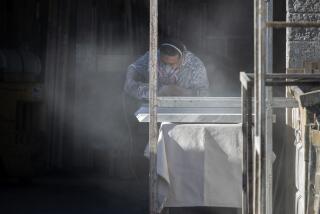Panel Studies Regulating Real Estate Appraisers
- Share via
WASHINGTON — Faced with growing concern about the credibility of real estate appraisers, Congress and appraisal groups are moving to regulate the industry.
In separate efforts, Rep. Doug Barnard Jr. (D-Ga.) and the eight major real estate appraisal associations are working to develop stricter standards by which appraisers assess the value of property and to toughen the requirements for becoming certified appraisers.
“We feel we have taken some whacks during the past year,” said Donald E. Kelly, legislative counsel of the Society of Real Estate Appraisers. “But we feel we should address the concerns.”
Thrifts and banks have long used appraisals to determine the value of a property before determining whether, and how much, to lend to buyers. But in recent years, the appraising process has become more controversial.
Congressional reports have blamed high appraisals in part for the increase in thrift failures in some areas of the country.
By getting a high appraisal, an owner can obtain a larger secured loan by using the inflated-value property as collateral. If the owner defaults on such a loan, however, lenders--and ultimately federal insurance funds--can get stuck with the losses.
Fraudulent Appraisals
Some of the abuses were brought out during hearings in December, 1985, by the House subcommittee on commerce, consumer and monetary affairs.
In September, 1986, the committee released a report that detailed its findings and linked fraudulent appraisal practices to the increased number of failed savings and loans.
The report also said that 10% to 15% of the $1.3 billion in losses suffered by private mortgage-insurance companies in 1984 and 1985 was caused by inaccurate and fraudulent appraisals.
In one case cited by the panel, a California developer, trying to secure a $10-million loan on a 150-acre tract of land, had an appraiser assess the land at $15 million.
What the appraiser did not tell the developer or the thrift was that the land was used as a toxic-waste dump.
Shortly after getting the loan, the developer defaulted on the loan and the land was sold for $1.5 million.
The subcommittee said the thrift had to absorb the loss because the value of the land was so severely overstated.
Responding to the concerns about appraisers, Barnard, a former banker who chairs the subcommittee, is planning to introduce a bill that would, in part, establish a private foundation to set minimum education and competency levels for real estate appraisers.
States would be required to set up licensing boards within three years after the bill is signed.
The legislation would create a federal council consisting of representatives of regulatory agencies such as the Federal Savings and Loan Insurance Corp. to monitor the quality of appraisals in federal projects.
“Clearly, there are billions of dollars in losses by thrifts due in some measure to appraisers overstating the value of their property,” said Peter Barash, staff director of the House subcommittee drafting the legislation.
At the same time, the nation’s eight major appraisal organizations have been meeting over the past 18 months to discuss and draft their own standards of practice and qualifications. The groups represent an estimated 250,000--about one-third--of the country’s appraisers.
“It’s our belief that there’s a legitimate place for federal oversight, particularly since the mortgage market is a national market and not just limited to a state or region,” said Roy E. Morris, president of the American Society of Appraisers. “Nowadays, all loans cross state lines.”
The industry groups are proposing the creation of a nonprofit organization to be called the Appraisal Foundation.
The primary members of the foundation would include the American Institute of Real Estate Appraisers, the National Assn. of Independent Fee Appraisers, the Society of Real Estate Appraisers, the American Society of Appraisers, the American Society of Farm Managers and Rural Appraisers, the International Assn. of Assessing Officers, the International Right of Way Assn. and the National Society of Real Estate Appraisers.
Louisiana OKs Law
In addition, there would be five members elected from other organizations, including academic and regulatory associations.
The foundation would have a standards board and a qualifications board.
The standards board would issue rulings on how to do accurate and ethical appraisals while the qualifications board would establish criteria, such as the number of required course hours, for people who want to become certified and recertified as appraisers.
In August, Louisiana state legislators passed the “Louisiana Certified Real Estate Appraisers Law.”
Under the law, a residential appraiser certification requires a college degree or 60 classroom hours in appraisal education in the past five years and two years of residential appraisal experience. A second category is general certification, which requires either a college degree or 120 classroom hours in appraisal education in the past five years and three years experience appraising all types of properties.
Under the law, an appraiser must earn 30 hours of appraisal education every two years.
Louisiana’s Real Estate Commission formed a nine-member appraisers’ subcommittee that will approve courses and certification exams, determine who has met the certification and recertification requirements and have the power to censure, suspend and revoke certifications for cause.
The National Assn. of Home Builders and the National Assn. of Realtors say they support state-by-state regulations, such as Louisiana’s law, instead of federal oversight. The NAHB passed a resolution several months ago opposing any federal regulation.
“It’s just not an appropriate role for the federal government to play,” said Kathleen Bolan, NAHB’s senior vice president of mortgage finance.
“Our feeling is that the efforts by government agencies have created some unrealistic standards. They don’t reflect local conditions,” Bolan said.
More to Read
Inside the business of entertainment
The Wide Shot brings you news, analysis and insights on everything from streaming wars to production — and what it all means for the future.
You may occasionally receive promotional content from the Los Angeles Times.










